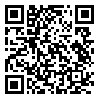BibTeX | RIS | EndNote | Medlars | ProCite | Reference Manager | RefWorks
Send citation to:
URL: http://jdisabilstud.org/article-1-1953-en.html
2- Assistant Professor of Educational Psychology, Faculty of Literature, Humanities and Social, Science and Research Branch, Islamic Azad University, Tehran, Iran
Abstract
Background & Objectives: Academic performance, or the level of success that every learner can achieve in education, indicates a student's learning level and is one of the most important concerns of any educational system. Given that academic performance is one of the most important concerns, basic goals, and a sign of success in the education system, it is important to identify its influential factors and solve the problems and shortcomings in the system. The issue of academic achievement becomes important when we know that many students can succeed but fail. Academic achievement is a multidimensional variable that is not only influenced by learning and school factors but also by individual and psychological issues; the motivation for progress is one of these factors. Academic burnout is an important factor in understanding that each person can have their own desirable or undesirable competencies and performance in any situation, including academic issues. This study aimed to investigate the effectiveness of mindfulness on achievement motivation and academic achievement of students with academic burnout.
Methods: This applied study is cross–sectional and quasi–experimental with a pretest–posttest and a 3–month follow–up design with a control group. The study population consisted of master's students of Psychology who were studying in the academic year of 2017–2018 at Islamic Azad University of Science Research Branch Tehran, Tehran City, Iran. The inclusion criteria were as follows: being a master's student in Islamic Azad University of Science Research Branch Tehran in Psychology, studying in the academic year 2017–2018, being 20 to 40 years old, and being willing to participate in a research project. The exclusion criteria for the experimental group were as follows: absence of more than two sessions from the educational program, unwillingness to continue attending the educational program, and not doing the homework and exercises of the educational program for two consecutive weeks. The study data were collected using the Academic Burnout Questionnaire (Breso et al., 1997), and a total number of 30 students with academic burnout higher than 30 were purposively selected and randomly assigned to experimental and control groups (15 students in each group). The two groups in the pretest, posttest, and follow–up phases completed the Achievement Motivation Questionnaire (Hermans, 1970), and their academic achievement was measured. The experimental group received 8 sessions of mindfulness, whereas the control group did not receive any intervention. Data analysis was done using descriptive statistics (mean, standard deviation, and graphing) and inferential statistics (repeated measures analysis of variance, Bonferroni post hoc test, and t test for two independent group comparisons) in SPSS version 22 software. The significance level of statistical tests was considered at 0.05.
Results: The results showed that the analysis of variance was significant for the intragroup factor (time) and the intergroup factor of the variables of academic achievement (p<0.001) and academic motivation (p<0.001). The interaction effect of group and time was also significant on academic achievement (p<0.001) and academic motivation (p<0.001), and its effect was 0.55 for achievement motivation and 0.81 for academic achievement. Also, the average scores of the variables of academic achievement and academic motivation in the experimental group in the posttest (p<0.05) and follow–up phases (p<0.05) were significantly higher than those in the control group.
Conclusions: Mindfulness could be used to increase scores of achievement motivation and academic achievement of students with academic burnout so that mindfulness can be recommended to an academic adviser.
| Rights and permissions | |
 |
This work is licensed under a Creative Commons Attribution-NonCommercial 4.0 International License. |





